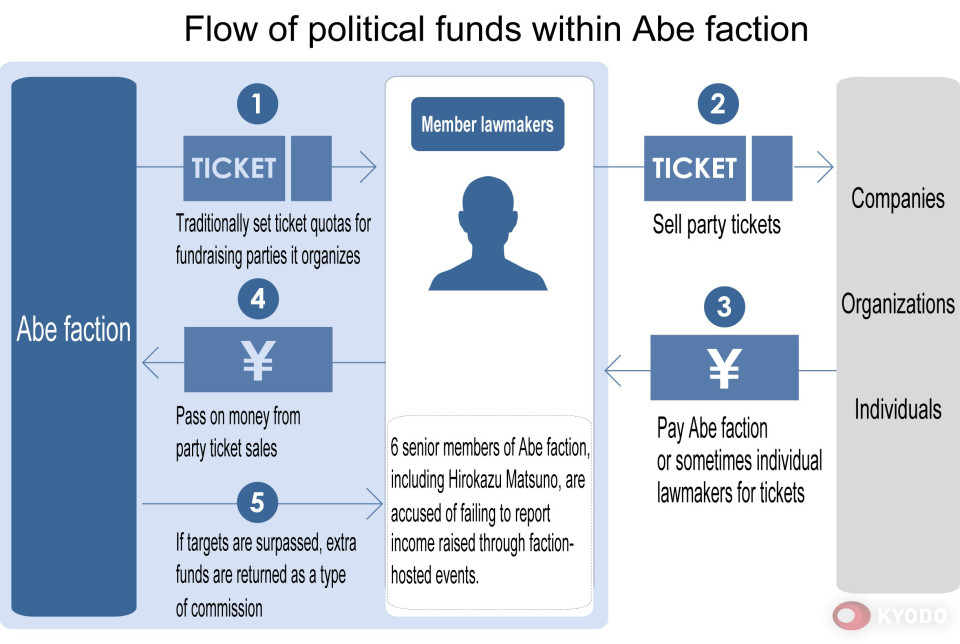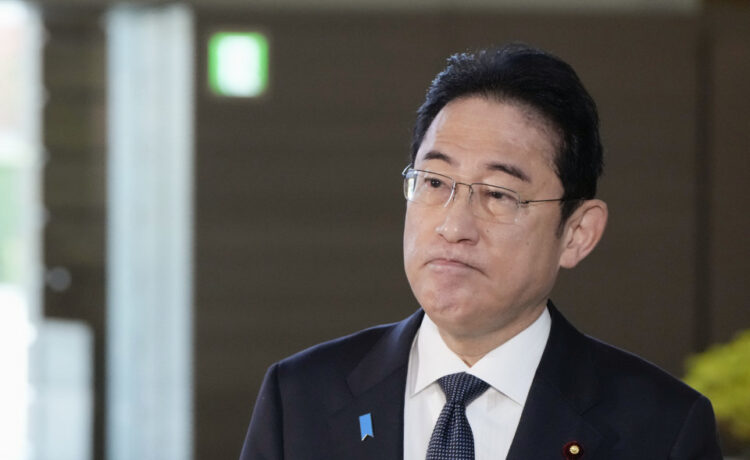The political fundraising scandal surrounding the Japanese ruling party’s biggest faction might signal an early end to the administration of Prime Minister Fumio Kishida, who is already under pressure over his relationship with a controversial religious group.
Chief Cabinet Secretary Hirokazu Matsuno is accused of failing to report millions of yen he received from revenue that the faction, previously headed by former Prime Minister Shinzo Abe, gained from fundraising events, sources close to the matter said Friday.

Japanese Prime Minister Fumio Kishida meets the press at his office in Tokyo on Dec. 11, 2023, with speculation mounting he plans to replace all ministers from the Liberal Democratic Party faction previously led by former Prime Minister Shinzo Abe in response to a series of political fundraising scandals. (Kyodo) ==Kyodo
With other members of the faction facing similar accusations as the scandal widens, Kishida has decided to dismiss Matsuno and replace all the other ministers in his Cabinet who belong to the faction, the sources said.
But with an increasing number of lawmakers within the Liberal Democratic Party concerned at the slump in the Kishida Cabinet’s approval ratings to their lowest levels since he took office in October 2021, moves to oust him may gain momentum.
One of the reasons for Kishida’s vulnerability is reports that senior figures of the Unification Church, often labeled a cult, attended a meeting with Kishida in 2019, when he was the party’s policy chief. The fallout has left many LDP members starting to believe they will not be able to win national elections with him as their leader, some pundits say.
Kishida has been keen to seek reelection as president of the ruling party in an election expected next September, but could find himself pressured not to run, said Takahide Kiuchi, executive economist at Nomura Research Institute.
Under the current circumstances, a “dynamic of replacing the prime minister ahead of a national election can be easily created within the party,” Kiuchi added.
Kishida does not need to face a House of Representatives election until the terms of the lower house’s members expire in the fall of 2025. A House of Councillors election is also scheduled for summer the same year.
A member of the ruling party, however, said the political fundraising scandal is certain to cause Kishida’s government to further lose public trust, which could prompt LDP lawmakers to call on him to step down as premier “as soon as possible.”
Some other LDP members, meanwhile, are concerned that Kishida will struggle to shrug off public skepticism about his ties with the Unification Church.
The meeting in 2019 was with a delegation led by former U.S. House of Representatives Speaker Newt Gingrich, who has acknowledged that individuals related to the Unification Church were present. The prime minister has claimed he was not aware of their presence.
But Kishida has been under pressure to provide more detailed explanations after he earlier instructed LDP lawmakers to sever their relations with the religious organization, which has been criticized for ruining many families by forcing members to make massive donations.
Kishida would “not be qualified” to remain premier if he cannot give a satisfactory account of the matter, said political commentator Harumi Arima.
Opposition parties, meanwhile, have been grilling Kishida, with some threatening to submit a no-confidence motion against his Cabinet by the end of the ongoing extraordinary parliamentary session on Wednesday, even though it is certain to be voted down by the ruling camp.

On Friday, Yukio Edano, a former leader of the main opposition Constitutional Democratic Party of Japan, lambasted Kishida’s leadership, saying his Cabinet is in “crisis.”
The Japanese Communist Party’s policy commission chair Tomoko Tamura told reporters, “It is clear that Kishida’s Cabinet is not one that can gain the trust of the people.”
Nevertheless, some opposition lawmakers have voiced fears that if a no-confidence motion is submitted to the Diet, Kishida might take a gamble by dissolving the lower house for a general election.
Such a scenario, which Kishida has hinted at, could catch the opposition parties off guard, giving them little time to prepare.
While the approval ratings for Kishida’s Cabinet have shown little signs of improvement, support rates for major opposition parties have not risen significantly, suggesting they may not be able to oust the LDP from power even under its flagging leader.
“To be honest, if the lower house election takes place soon, we are not confident in beating the LDP. The party would be deprived of a large number of seats as it is almost a lame duck, but it can still secure a majority,” said a lawmaker belonging to an opposition party.
“Giving the LDP a majority would mean giving confidence to Kishida’s Cabinet,” the lawmaker said, adding, “If possible, we do not want a lower house election to be held anytime soon.”
Related coverage:
PM Kishida mulls replacing all ministers from Abe faction: sources
PM Kishida to sack gov’t spokesman Matsuno amid funds scandal: sources
Top spokesman accused of not reporting 10 mil. yen in income: source















